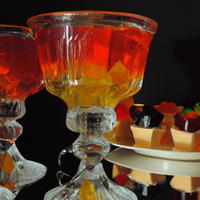
1 serving (120 grams) contains 90 calories, 0.0 grams of protein, 0.0 grams of fat, and 22.0 grams of carbohydrates.

Log this food in SnapCalorie

Nutrition Information
Calories |
177.4 | ||
|---|---|---|---|
% Daily Value* |
|||
| Total Fat | 0 g | 0% | |
| Saturated Fat | 0 g | 0% | |
| Polyunsaturated Fat | 0 g | ||
| Cholesterol | 0 mg | 0% | |
| Sodium | 19.7 mg | 0% | |
| Total Carbohydrates | 43.4 g | 15% | |
| Dietary Fiber | 0 g | 0% | |
| Sugars | 39.4 g | ||
| protein | 0 g | 0% | |
| Vitamin D | 0 mcg | 0% | |
| Calcium | 9.9 mg | 0% | |
| Iron | 0.2 mg | 1% | |
| Potassium | 19.7 mg | 0% | |
* Percent Daily Values are based on a 2,000 calorie diet. Your daily values may be higher or lower depending on your calorie needs.
Food Attributes
Source of Calories
About Fruit jelly cup
Fruit Jelly Cups are delightful, single-serving desserts made with sweetened gelatin and fruit flavors, often containing small pieces of real fruit or juice for added texture and taste. Originating from various global cuisines but particularly popular in East Asia, these treats come in a wide range of flavors like strawberry, mango, and lychee, making them versatile and appealing to many. Nutritionally, they are low in fat and calories, making them a popular choice for light snacks or desserts. However, many Fruit Jelly Cups contain added sugars and artificial flavorings, which can reduce their overall health value. Some variants also use carrageenan or other stabilizers that can be a concern for sensitive individuals. Opting for versions with natural fruit juices and reduced sugars can enhance their nutritive profile, ensuring a more wholesome and flavorful experience.



